#institute for the critical study of zionism
Explore tagged Tumblr posts
Text
A collective of activist professors have started an institute dedicated to delegitimizing Zionism, Zionists and the State of Israel after receiving objections to their academic vilification of Israel.
Founded in mid-2023 by prolific antisemitic professors, some of whom were instrumental in advancing the Boycott, Divestment, Sanctions (BDS) movement in academia, the Institute for the Critical Study of Zionism (ICSZ) disregards academic integrity and historical accuracy. Instead, it is laser-focused on the myopic agenda of depicting Zionism as the greatest ill of the world.
Hailing from across the U.S., with a handful of international members, the founding collective comprises professors primarily from Critical Ethnic Studies and humanities departments, both bastions of anti-Israel activity.
Key Findings
ICSZ’s Agenda: Delegitimizing and Dismantling Israel
Founded by Anti-Israel Activists Committed to Opposing Zionism
Distorted Definition of Zionism
Supporting “Resistance” and Rationalizing Violence
Active Opposition to the IHRA Definition of Antisemitism
The Institute for the Critical Study of Zionism’s Motives & Operating Principles
Classic Antisemitism Repackaged as Anti-Zionism
Much like the classic antisemitic trope that claims Jews are the source of every problem in the world, ICSZ and the newly coined “discipline” of Critical Zionist Studies seek to uncover nefarious actions by “Zionism” and “Zionists” in all areas of society. The institute explains its interdisciplinary approach to Zionism:
“To support the delinking of the study of Zionism from Jewish Studies, and to reclaim … the study of Zionism as a political, ideological, and racial and gendered knowledge project that intersects with Palestine and decolonial studies, critical terrorism studies, settler colonial studies, studies of land and climate, disability, performance, and many other related areas scholarship and activism … “ … The Institute approaches Zionism as a broad set of colonial and repressive work and solidarities “ … Zionism’s project extends beyond the borders of Palestine.”
Ironically, the professors involved in the institute each have varying definitions of Zionism; even the institute's website does not include a clear definition of the word around which the entire institute revolves.
In the “Points of Unity,” the institute simply declares, “Zionism is a settler colonial racial project.” Director Emmaia Gelman says, “Zionism is a term that holds a lot of things. It describes the existing state of Israel and its collaboration with other powers, and its history, politics, ideology, and culture built around them.”

vimeo
#institute for the critical study of zionism#zionism#academia#antisemitism#anti-zionism#israel#Vimeo
15 notes
·
View notes
Text
By TAMMI ROSSMAN-BENJAMIN
In March 1941, Nazi theorist and ideologue Alfred Rosenberg launched the Institute for Research on the Jewish Question. Its inaugural conference, “Research in the Struggle against World Jewry,” featured talks by many scholars, including the Institute’s director, historian Wilhelm Grau, who concluded that the only viable solution to the Jewish question was for the Jews to disappear.
Rosenberg’s Institute was one of several established to support the Third Reich’s efforts to provide an empirical basis for their anti-Jewish policies. To that end, the scholars affiliated with these institutes endeavored to put in place a new interdisciplinary field of study that would draw on various academic disciplines to promulgate antisemitic scholarship about the Jews.
According to Alan Steinweis’ book, “Studying the Jew: Scholarly Antisemitism in Nazi Germany,” this new brand of scholarship, which he dubs “Nazi Jewish Studies,” demonstrates its practitioners’ “cynical manipulation of scientific knowledge, historical events, religious texts, and statistical data” in the service of “justifying the disenfranchisement, expropriation, and removal of Jews from German society.”
Fast forward to August 2023.
Two academic leaders of the U.S. Campaign for the Academic and Cultural Boycott of Israel (USACBI) – San Francisco State University Professor Rabab Abdulhadi and University of Massachusetts Boston Professor Heike Schotten - co-authored an article explaining why they recently established the Institute for the Critical Study of Zionism (ICSZ).
Describing ICSZ as “explicitly anti-Zionist” and “strictly committed to abiding by the BDS picket line,” Abdulhadi and Schotten link their new Institute to “the long history of struggle” against efforts “to conflate Zionist politics and ideology with Jews or Jewishness.”
In October, the Institute will be holding an inaugural conference entitled “Battling the ‘IHRA definition’: Theory & Activism” to provide academics and activists with tools for delegitimizing the most widely accepted definition of antisemitism, which rightly identifies anti-Zionism as a form of antisemitism, but is being portrayed by conference organizers as “a tool of and a shield for repressive state power.”
#usacbi#rabab abdulhadi#heike schotten#institute for the critical study of zionism#icsz#bds#nazis#bds nazis#research on the jewish question#alfred rosenberg
20 notes
·
View notes
Text
PALESTINE FILM INDEX
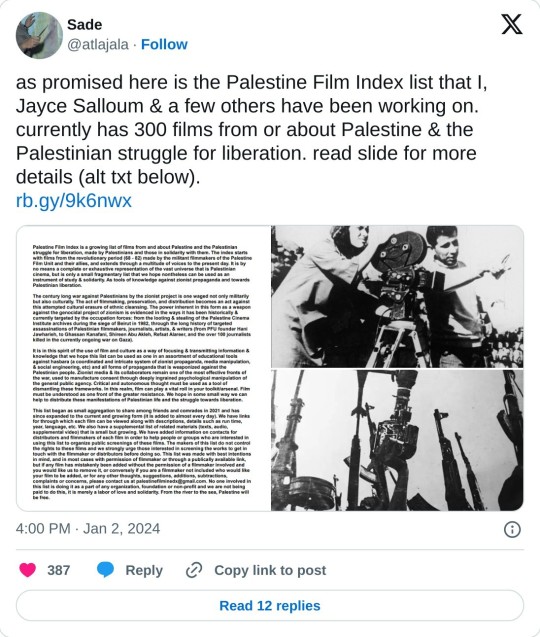
Palestine Film Index is a growing list of films from and about Palestine and the Palestinian struggle for liberation, made by Palestinians and those in solidarity with them. The index starts with films from the revolutionary period (68 - 82) made by the militant filmmakers of the Palestine Film Unit and their allies, and extends through a multitude of voices to the present day. It is by no means a complete or exhaustive representation of the vast universe that is Palestinian cinema, but is only a small fragmentary list that we hope nontheless can be used as an instrument of study & solidarity. As tools of knowledge against zionist propaganda and towards Palestinian liberation.
The century long war against Palestinians by the zionist project is one waged not only militarily but also culturally. The act of filmmaking, preservation, and distribution becomes an act against this attempted cultural erasure of ethnic cleansing. The power inherent in this form as a weapon against the genocidal project of zionism is evidenced in the ways it has been historically & currently targeted by the occupation forces: from the looting & stealing of the Palestine Cinema Institute archives during the siege of Beirut in 1982, through the long history of targeted assassinations of Palestinian filmmakers, journalists, artists, & writers (from PFU founder Hani Jawharieh, to Ghassan Kanafani, Shireen Abu Akleh, Refaat Alareer, and the over 100 journalists killed in the currently ongoing war on Gaza).
It is in this spirit of the use of film and culture as a way of focusing & transmitting information & knowledge that we hope this list can be used as one in an assortment of educational tools against hasbara (a coordinated and intricate system of zionist propaganda, media manipulation, & social engineering, etc) and all forms of propaganda that is weaponized against the Palestinian people. Zionist media & its collaborators remain one of the most effective fronts of the war, used to manufacture consent through deeply ingrained psychological manipulation of the general public agency. Critical and autonomous thought must be used as a tool of dismantling these frameworks. In this realm, film can play a vital roll in your toolkit/arsenal. Film must be understood as one front of the greater resistance. We hope in some small way we can help to distribute these manifestations of Palestinian life and the struggle towards liberation.
This list began as small aggregation to share among friends and comrades in 2021 and has since expanded to the current and growing form (it is added to almost every day). We have links for through which each film can be viewed along with descriptions, details such as run time, year, language, etc. We also have a supplemental list of related materials (texts, audio, supplemental video) that is small but growing. We have added information on contacts for distributors and filmmakers of each film in order to help people or groups who are interested in using this list to organize public screenings of these films. The makers of this list do not control the rights to these films and we strongly urge those interested in screening the works to get in touch with the filmmaker or distributors before doing so. This list was made with best intentions in mind, and in most cases with permission of filmmaker or through a publically available link, but if any film has mistakenly been added without the permission of a filmmaker involved and you would like us to remove it, or conversely if you are a filmmaker not included who would like your film to be added, or for any other thoughts, suggestions, additions, subtractions, complaints or concerns, please contact us at [email protected]. No one involved in this list is doing it as a part of any organization, foundation or non-profit and we are not being paid to do this, it is merely a labor of love and solidarity. From the river to the sea, Palestine
#this is incredible#palestinian cinema#palestine film index#link on title!!#world cinema#film#dailyworldcinema#albertserra
2K notes
·
View notes
Text
every time i recommend a book on palestine or israel by an israeli author i get mad all over again about how much the field is literally dominated by them. like israeli institutions literally have the monopoly on studies of palestine that even critiques of israeli nationalism and zionism come from the israeli side. because of the occupation, their institutions deny resources to palestinian scholars and institutions by using them themselves, thus maintaining the monopoly and controlling the narrative. this means that palestinian scholars are often forced to submit to the racist zionist policies of israeli universities if they want their research funded. the fact that they allow critical perspectives means that they are so secure in their power they don't view them as a threat, cos they know that the scholars need them for their resources, which means they get to set the terms and hold these resources over ppls heads, and they have the power to cut ppl off immediately if they step out of line. see what happened to nadera shalhoub kevorkian at the hebrew university last year. this is why the academic boycott is so important.
#like even the journal of palestine studies publishes israeli academics cos they literally have no choice. no one else gets funding#which means no one else gets to stand out in the field
303 notes
·
View notes
Text

Really great org about how zionism and its study within academic spaces should be a critical examination of power structures. Highly encourage you to click through this website to understand how embedded zionism is within our culture and public media even separate from israel.
722 notes
·
View notes
Text
Arno Rosenfeld at The Forward:
The Heritage Foundation plans to “identify and target” volunteer editors on Wikipedia who it says are “abusing their position” by publishing content the group believes to be antisemitic, according to documents obtained by the Forward. Employees of Heritage, the conservative think tank that produced the Project 2025 policy blueprint for the second Trump administration, said they plan to use facial recognition software and a database of hacked usernames and passwords in order to identify contributors to the online encyclopedia, who mostly work under pseudonyms. It’s not clear exactly what kind of antisemitism the Wikipedia effort, which has not been previously reported, is intended to address. But in recent months some Jewish groups have complained about a series of changes on the website relating to Israel, the war in Gaza and its repercussions. In June, a panel of Wikipedia editors declared the Anti-Defamation League a “generally unreliable” source of information about the Israeli-Palestinian conflict, limiting when the organization can be cited in Wikipedia articles. And there was an outcry this fall among some Jewish scholars and pro-Israel activists over edits to Wikipedia’s entry for Zionism to add references to “colonization.” [...] The Heritage Foundation sent the pitch deck outlining the Wikipedia initiative to Jewish foundations and other prospective supporters of Project Esther, its roadmap for fighting antisemitism and anti-Zionism. The slideshow says the group’s “targeting methodologies” would include creating fake Wikipedia user accounts to try to trick editors into identifying themselves by sharing personal information or clicking on malicious tracking links that can identify people who click on them. It is unclear whether this has begun.
[...] Allegations of bias Wikipedia has long faced claims from conservatives that it has a liberal bias. Chaya Raichik, the Orthodox former real estate broker behind “Libs of TikTok,” has assailed Wikimedia’s spending on diversity programming, for example. And a June study from the right-leaning Manhattan Institute found a “mild to moderate tendency” for Wikipedia to more negatively describe some conservative public figures. Several prominent Jewish groups have also expressed concern that Wikipedia is tilted against Israel. A World Jewish Congress has released a report in March said the site’s articles about the Israel-Hamas war were biased in “terminology, framing and lack of context, one-sided sources and critical omissions,” while Aish.com, an Orthodox news website, said in November that it had been “hijacked by digital jihadists.” In May, the Los Angeles Jewish Journal ran a cover story titled “Wokepedia?” that described “seven tactics Wikipedia editors used to spread anti-Israel bias.” The article said that the term “anti-imperialism” had been added to the Hamas page as one of the Palestinian terror group’s ideologies, and the term “antisemitism” removed. Neither term is currently on the Hamas page; editors frequently discuss and change the content of controversial articles.
Radical right-wing organization The Heritage Foundation’s Project Esther is planning to identify and target Wikipedia editors as part of its project to combat antisemitism and anti-Zionism. In reality, such a campaign would serve to intimidate Wikipedia for its alleged pro-Palestinian bias.
#The Heritage Foundation#Project Esther#Project 2025#Israel Apartheid#Censorship#Wikipedia#Gaza Genocide#Israel/Hamas War#Palestine#Wikimedia Foundation#Antisemitism#Tom Olohon
37 notes
·
View notes
Text

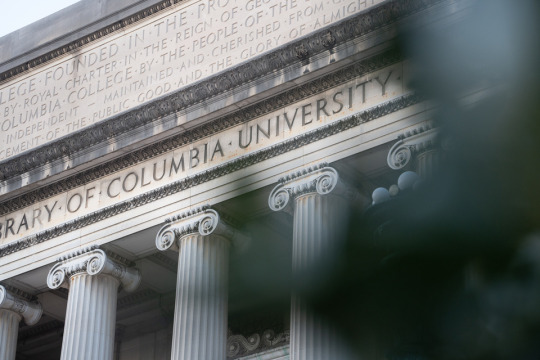
Dear President Shafik,
We write as Jewish faculty of Columbia and Barnard in anticipation of your appearance before the House Committee on Education and the Workforce on April 17, where you are expected to answer questions about antisemitism on campus. Based on the committee’s previous hearings, we are gravely concerned about the false narratives that frame these proceedings to entrap witnesses. We urge you, as the University president, to defend our shared commitment to universities as sites of learning, critical thinking, and knowledge production against this new McCarthyism.
Rather than being concerned with the safety and well-being of Jewish students on campuses, the committee is leveraging antisemitism in a wider effort to caricature and demonize universities as hotbeds of “woke indoctrination.” Its opportunistic use of antisemitism in a moment of crisis is expanding and strengthening longstanding efforts to undermine educational institutions. After launching attacks on public universities from Florida to South Dakota, this campaign has opened a new front against private institutions.
The prospect of Rep. Elise Stefanik, a member of congress with a history of espousing white nationalist politics, calling university presidents to account for alleged antisemitism on their campuses reveals these proceedings as disingenuous political theater.
In the face of these coordinated attacks on higher education, universities must insist on their freedom to research and teach inconvenient truths. This includes historical injustices and the contemporary structures that perpetuate them, regardless of whether these facts are politically inexpedient for certain interest groups.
To be sure, antisemitism is a grave concern that should be scrutinized alongside racism, sexism, Islamophobia, homophobia, and all other forms of hate. These hateful ideologies exist everywhere and we would be ignorant to believe that they don’t exist at Columbia. When antisemitism rears its head, it should be swiftly denounced, and its perpetrators held to account. However, it is absurd to claim that antisemitism—“discrimination, prejudice, hostility or violence against Jews as Jews,” according to the Jerusalem Declaration’s definition—is rampant on Columbia’s campus. To argue that taking a stand against Israel’s war on Gaza is antisemitic is to pervert the meaning of the term.
Labeling pro-Palestinian expression as anti-Jewish hate speech requires a dangerous and false conflation of Zionism with Jewishness, of political ideology with identity. This conflation betrays a woefully inaccurate understanding—and disingenuous misrepresentation—of Jewish history, identity, and politics. It erases more than a century of debates among Jews themselves about the nature of a Jewish homeland in the biblical Land of Israel, including Israel’s status as a Jewish nation-state. It dismisses the experiences of the post-Zionist, non-Zionist, and anti-Zionist Jews who work, study, and live on our campus.
The political passions that arise from conflict in the Middle East may deeply unsettle students, faculty, and staff with opposing views. But feeling uncomfortable is not the same thing as being threatened or discriminated against. Free expression, which is fundamental to both academic inquiry and democracy, necessarily entails exposure to views that may be deeply disconcerting. We can support students who feel real and valid discomfort toward protests advocating for Palestinian liberation while also stating clearly and firmly that this discomfort is not an issue of safety.
As faculty, we dedicate ourselves and our classrooms to keeping every student safe from real harm, harassment, and discrimination. We commit to helping them learn to experience discomfort and even confrontation as part of the process of skill and knowledge acquisition—and to help them realize that ideas we oppose can be contested without being suppressed.
By exacting discipline, inviting police presence, and broadly surveilling its students for minor offenses, the University is betraying its educational mission. It has pursued drastic measures against students, including disciplinary proceedings and probation, for infractions like allegedly attending an unauthorized protest, or moving barricades to drape a flag on a statue. Real harassment and physical intimidation and violence on campus must be confronted seriously and its perpetrators held accountable. At the same time, the University should refrain whenever possible from using discipline and surveillance as means of addressing less serious harms, and should never use punitive measures to address conflicts over ideas and the feelings of discomfort that result. Where the University once embraced and defended students’ political expression, it now suppresses and disciplines it.
The University’s recent policies represent a dramatic change from historical practice, and the consequences are ruinous to our community and its principles. In the past, Columbia has periodically confronted attacks against pro-Palestinian speech, ranging from the vile slanders against Professor Edward Said to the reckless accusations from the David Project. But where for decades the University stood firm against smear campaigns targeting its professors, it has now voluntarily accepted the job of censoring its faculty in and outside the classroom.
Columbia’s commitment to free inquiry and robust disagreement is what makes it a world-class institution. Limiting academic freedom when it comes to questions of Israel and Palestine paves the way for limitations on other contested topics, from climate science to the history of slavery. What’s more, students must have the freedom to dissent, to make mistakes, to offend without intent, and to learn to repair harm done if necessary. Free expression is not only crucial to student development and education outside the classroom; the tradition of student protest has also played a vital role in American democracy. Columbia should be proud of having participated in nationwide student organizing that helped secure civil rights and reproductive rights and helped bring an end to the Vietnam War and apartheid in South Africa.
We express our support for the University and for higher education against the attacks likely to be leveled against them at the upcoming congressional hearing. We object to the weaponization of antisemitism. And we advocate for a campus where all students, Jewish, Palestinian, and all others, can learn and thrive in a climate of open, honest inquiry and rigorous debate.
Many members of our University community share our perspective, but they have not yet been heard. Columbia students, staff, alumni, and faculty can sign here to show your support for this letter’s message.
���Jewish faculty reject the weaponization of antisemitism
The 23 authors of this letter are Jewish faculty members of Barnard College and Columbia University. This letter derives from a much longer one by these same 23 faculty sent to President Shafik on April 5.
#politics#palestine#israel#columbia university#antisemitism#anti zionisim#antizionism#weaponized antisemitism#minouche shafik#anti zionism ≠ antisemitism#zionism#rafah#gaza#white supremacy#racism#barnard college#protests#israel is a terrorist state#war crimes#ethnic cleansing#weaponized identity politics#colonialism#imperialism#student protests#human rights#human rights violations#bds#boycott divest sanction#hasbara#idpol
87 notes
·
View notes
Text
Daily update post:
The IDF confirmed that yesterday's barrage of rockets at Tel Aviv and its vicinity was fired out of a zone that it defined as "humanitairan" (meaning an area it encouraged civilians to evacuate to).
We're seeing more and more Palestinians who speak up against Hamas. In the past (even during this war), Al-Jazeera "journalists" cut off Gazans who were criticizng Hamas. Now we have a small shift, where this journalist is still trying to persuade this woman not to criticize Hamas, but he doesn't cut her off as she insists on expressing her anger, that all of the aid to Gazans is being stolen by Hamas terrorists:
After a battle with terrorists inside a UN school in the neighborhood of Shujayiah in Gaza, IDF soldiers documented finding weapons hidden inside a teddy bear (first vid in this article).
As you might remember, I work at Yad Vashem, Israel's national Holocaust museum, research and education center, which also studies Jewish history in general, a subject that obviously includes the history of antisemitism. However, the scope of the history we covered always stopped roughly at when the last Jewish Holocaust survivor left the last DP (displaced persons) camp, which is 1956. The assumption was always that we will research historical antisemitism, and people will be able to take that knowledge, learn from it, and apply it to current ("new") antisemitism, without us tackling it directly. Following the biggest massacre of Jews since the Holocaust, the global rise in amtisemitic attacks in reaction to it, and the academic rot we have witnessed in dealing with antisemitism on the campuses of some of the most important universities in the world, this is going to change. YV will expand the work of our research institute into new antisemitism (anti-Zionism, really).
Yesterday, three Hezbollah terrorists were killed in a strike in Syria. You absolutely should be asking yourself why Hezbollah, a terrorist organization that claims to be the "defender of Lebanon," had a unit operating in Syria. Just a reminder: there have been rockets fired at Israel from Syria.
Another thing that happened yesterday, is that we got confirmation Hamas is also using female terrorists. So when you hear, "This is the number of children killed! This is the number of women killed!" (beyond a healthy suspicision we should all have of the uncorroborated figures provided by a terrorist organization), remember that Hamas uses teenagers and women as terrorists, not just as human shields. And it will NEVER report them as such. It barely recognizes that any terrorists were killed in this war, even though independent estimates indicate that "above 5,000 terrorists" is the most conservative estimate on this matter.
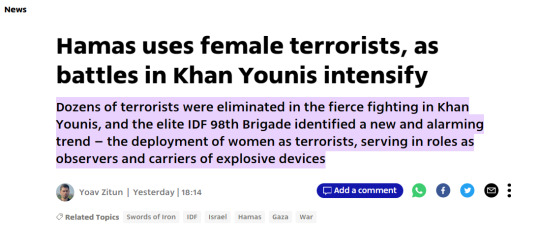
Unlike Hamas, which doesn't admit when women fight and die for it, Israel is proud of its female fighters. Here's a vid about a group of soldiers who made history on Oct 7, being the first female tankists in the world to fight in an armored battle.
youtube
This is 25 years old Sahar Baruch.
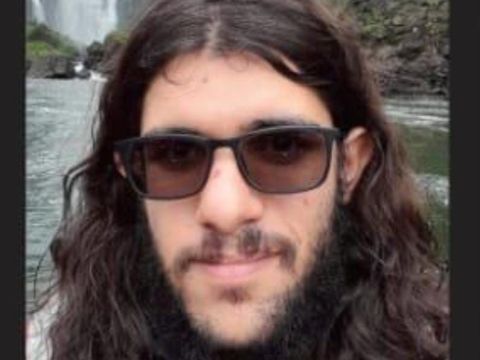
On Oct 7, he was kidnapped to Gaza. Hamas has published a vid that first showed sahar captured, and then showed his lifeless and bloodied body, indicating that he was murdered in captivity. May his memory be a blessing.
(for all of my updates and ask replies regarding Israel, click here)
#israel#antisemitism#israeli#israel news#israel under attack#israel under fire#israelunderattack#terrorism#anti terrorism#hamas#antisemitic#antisemites#jews#jew#judaism#jumblr#frumblr#jewish#Youtube
112 notes
·
View notes
Text
youtube
This is the latest in our series of conversations with Dr. Lara Sheehi. We will continue to talk about the genocide in Palestine, the resistance, psychic intrusion, and psy-ops. In this discussion we will also tackle feelings of love for the people, and feelings of hatred towards one's enemies.
Lara Sheehi (she/her) is an Assistant Professor of Clinical Psychology at the Doha Institute for Graduate Studies, Qatar. She is the founding faculty director of the Psychoanalysis and the Arab World Lab. Lara’s work takes up decolonial and anti-oppressive approaches to psychoanalysis, with a focus on liberation struggles in the Global South. She is co-author with Stephen Sheehi of Psychoanalysis Under Occupation: Practicing Resistance in Palestine (Routledge, 2022) which won the Middle East Monitor's 2022 Palestine Book Award for Best Academic Book. Lara is on the advisory board for the USA-Palestine Mental Health Network and the Institute for the Critical Study of Zionism. Lara is currently working on a new book, From the Clinic to the Street: Psychoanalysis for Revolutionary Futures (Pluto, 2025).
Our conversations with Lara Sheehi are all collected in this playlist: • Palestine, Resistance, Settler Coloni...
Support the show by becoming a patreon: / millennialsarekillingcapitalism
29 notes
·
View notes
Text
image description by @swosheep

ID 1: all images are screenshots of an Instagram post by j3wess, and are on a light green background with an even lighter green grid pattern. The first image is a title written in dark green text. It reads: "Evangelicals are the primary supporters of Israel in the US, not Jews". There is two Stars of David beside the words 'not Jews'. A wavy green line underlines everything.
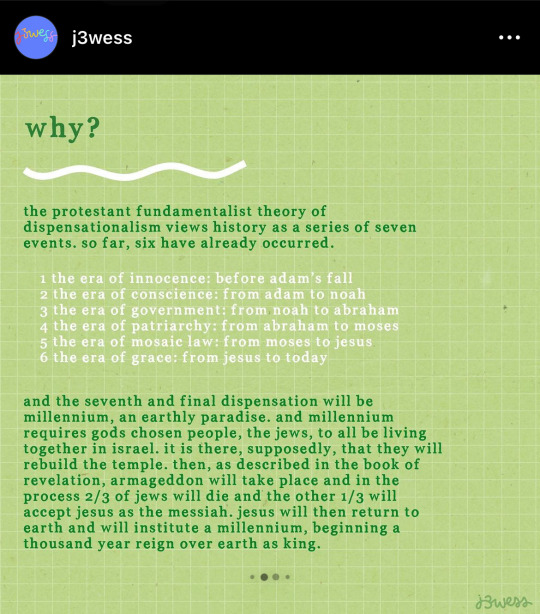
ID 2: the second image is titled "why?". The title is separated from the body by a wavy white line. The body text reads: "the protestant fundamentalist theory of dispensationalism views history as a series of seven events. so far, six have already occurred." An ordered list, in white text, reads: "1 the era of innocence: before adam's fall. 2 the era of conscience: from adam to noah. 3 the era of government: from noah to abraham. 4 the era of patriarchy: from abraham to moses. 5 the era of mosaic law: from moses to jesus. 6 the era of grace: from jesus to today." The green body text continues: "and the seventh and final dispensation will be millennium, an earthly paradise. and millennium requires gods chosen people, the jews, to all be living together in israel. it is there, supposedly, that they will rebuild the temple. then, as described in the book of revelation, armageddon will take place and in the process 2/3 of jews will die and the other 1/3 will accept jesus as the messiah. jesus will then return to earth and will institute a millennium, beginning a thousand year reign over earth as king."
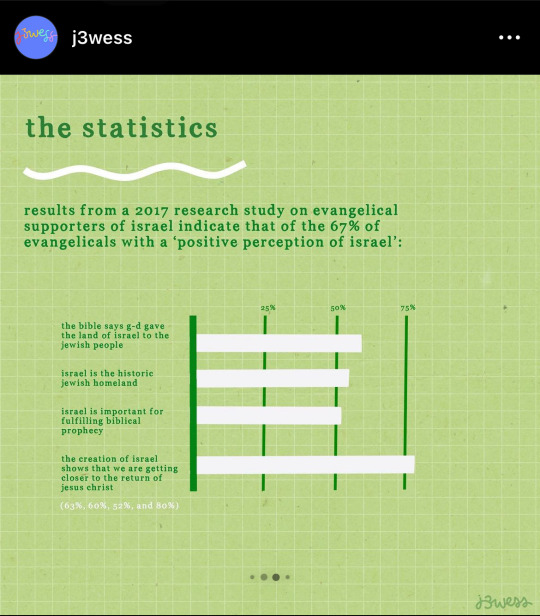
ID 3: the third image is titled "the statistics". a white wavy line separates the title from the body text. The body text reads: "results from a 2017 research study on evangelical supporters of israel indicate that of the 67% of evangelicals with a 'positive perception of israel':" Below, there is a bar graph. The first bar is captioned: "the bible says g-d gave the land of israel to the jewish people". The bar is at 63 percent. THe second bar is captioned: "israel is the historic jewish homeland". The bar is at 60 percent. The third bar is captioned: "israel is important for fulfilling biblical prophecy". The bar is at 52 percent. The fourth bar is captioned: "the creation of israel shows that we are getting closer to the return of jesus christ". The bar is at 80 percent.

ID 4: The fourth image is titled "what's scary about this?" A white wavy line separates the title from the body text. The body text reads: "a majority of christian support for zionism and israel is because it will supposedly trigger the return of christ. in order for this to happen requires for a) all diasporic jews to return to the land, therefore displacing palestinians and b) jews to be either proselytized and abandon their own religion for christ or die." Below this text, a second title reads: "what's even scarier?". Body text reads: "despite israel claiming to represent and protect all jews, it prioritizes the support of evangelicals."
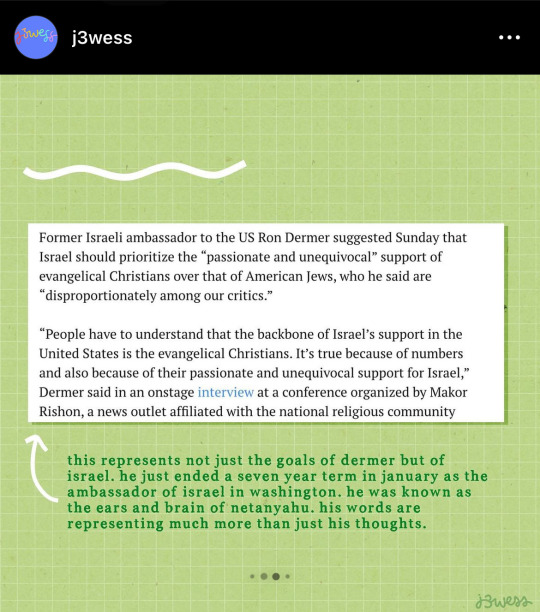
ID 5: the fifth image is untitled. It has a screenshot from an article which reads: "Former Israeli ambassador to the US Ron Dermer suggested Sunday that Israel should prioritize the 'passionate and unequivocal' support of evangelical Christians over that of American Jews, who he said are 'disproportionately among our critics.' 'People have to understand that the backbone of Israel's support in the United States is the evangelical Christians. It's true because of numbers and also because of their passionate and unequivocal support for Israel,' Dermer said in an onstage interview at a conference organized by Makor Rishon, a news outlet affiliated with the national religious community". Green text below it says: "this represents not just the goals of dermer but of israel. he just ended a seven year term in january as the ambassador of israel in washington. he was known as the ears and brain of netanyahu. his words are representing much more than just his thoughts." There is a white arrow pointing from the green text up to the article screenshot.
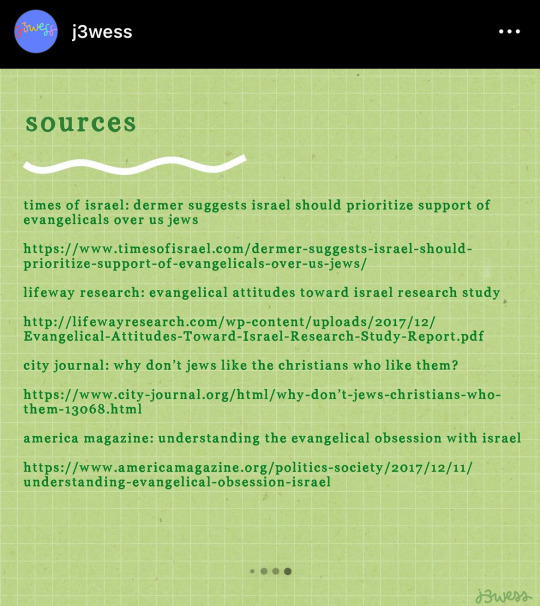
ID 6: the sixth image is titled "sources". There is a wavy white line separating the title from the body text. The body text consists of four sources, which are as follows: "times of israel: dermer suggests israel should prioritize support of evangelicals over us jews. lifeway research: evangelical attitudes toward israel research study. city journal: why don't jews like the christians who like them? america magazine: understanding the evangelical obsession with israel."
working links include:
#resources#palestine#jewish#israel#united states#evangelicals#instagram#reaux speaks#colonialism#genocide#occupation#religion#free palestine
107 notes
·
View notes
Text
The International Holocaust Remembrance Alliance (IHRA) definition, the most authoritative and internationally-accepted definition of antisemitism today, rightly understands that the vast majority of Jews worldwide are inextricably linked to the Jewish state and identifies physical and verbal threats to Israel’s existence as forms of antisemitism. As such, the Institute’s inaugural conference, whose purpose is to battle the IHRA definition by denying the connection between Zionism and Judaism, constitutes a broadside attack on Jewish identity and the Jewish state that is antisemitic in both intent and effect.
Among the conference’s co-sponsors are Hong’s Critical Race and Ethnic Studies Department and its Center for Racial Justice at UCSC, as well as the UC Ethnic Studies Faculty Council.
Shockingly, despite the fact that the conference is being held at a University of California campus with official departmental sponsorship and possible university funding, all speakers and attendees are required to “confirm their agreement” with the anti-Zionist “points of unity” that guide the Institute’s work. These include identifying Zionism as “a settler colonial racial project” linked to “group supremacy,” “ethnic cleansing,” and “racism,” and agreeing to “join in resistance” against Zionist repression.
For Christine Hong and fellow UC Ethnic Studies Council members, the anti-Zionist focus of the Institute and its inaugural conference is not just personal, it’s professional – part and parcel of how they understand their discipline, teach it to their students, and believe it should be taught to high school students throughout the state.
#ethnic studies#christine hong#antisemitism#institute for the critical study of zionism#zionism#israel#uc ethnic studies faculty council
13 notes
·
View notes
Text
By Susan Edelman and Deirdre Bardolf
Activists and foreign actors have infiltrated the city’s public schools with anti-Israel materials, fostering bias and hatred of Jews, according to a new report by a nonprofit think tank.
Teacher groups like NYC Educators for Palestine have collaborated with extremist organizations, some allegedly tied to hostile foreign governments and terrorist groups, to bring “radical, anti-American ideologies” into schools, said the Network Contagion Research Institute, or NCRI, and the advocacy group New York City Public School Alliance, which co-wrote the report.
“The report exposes how the Department of Education’s vetted resources enable radical sympathizers to shape young minds with biased information,” said Tova Plaut, a DOE pre-K coordinator and co-founder with teacher Karen Feldman of NYCPS Alliance, a group of Jewish educators who contributed to the project.
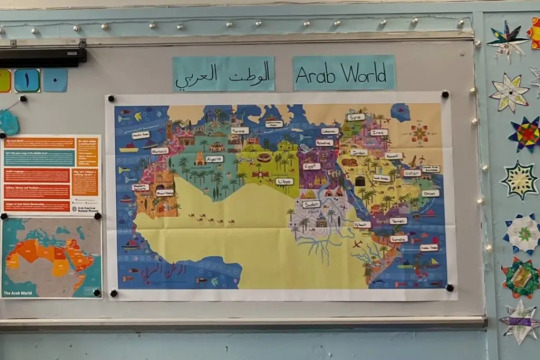
8An “Arab World” classroom map at Brooklyn’s PS 261 that excluded Israel was provided by the Qatar Foundation, an arm of the country’s ruling family, which has donated $1 million to NYC schools.
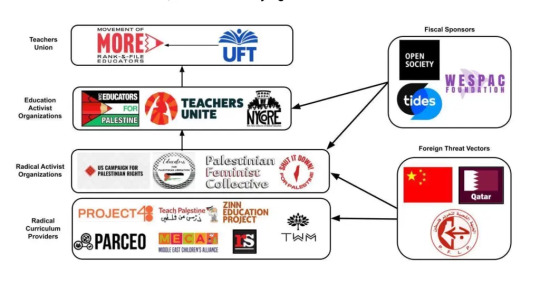
8The report found a network of “radical” curriculum developers, activist educator groups and foreign influences that have contributed to the infiltration of anti-Israel materials within the NYC public school system.NCRI
Set for release this week, the report cites DOE documents, school events and staff social media posts as evidence of its findings.
It calls on the DOE to immediately conduct a curriculum review; enforce the chancellor’s anti-discrimination policies; adopt a definition of antisemitism and mandate training on it; and increase oversight of foreign funding.
“If these ideas are left unchecked, they will be internalized by a new generation of students, who will then graduate, attend university, vote, enter the workforce, and raise families of their own, further embedding antisemitic beliefs into wider American society,” the NCRI and NYC Public Schools Alliance said.
Among the findings:
The DOE’s recommended resources for teachers include the Zinn Education Project, which provide lessons, workshops and articles highly critical of Israel and the US.
The DOE staff resource list links to the Zinn website, which features a section on “Teaching About Palestine-Israel and the Unfolding Genocide in Gaza” that claims, “Israel has turned Gaza into a ‘graveyard for children.”
Beacon High School in Midtown used Zinn lessons and articles, along with videos from Arab news network Al Jazeera, for a 10th-grade social studies class on the Israel-Palestine conflict, emails reviewed by The Post show.
The content “demonized Jews” while referring to Hamas as “a political party and militant group,” not as terrorists, parents said.
Other resources available for NYC teachers to use at “their discretion” include those from the Teach Palestine project, which gives materials that emphasize “Palestinian victimhood” and frame Zionism as a “colonialist” movement.
Teach Palestine is financially supported by the Middle East Children’s Alliance (MECA), a California-based nonprofit with reported ties to the Popular Front for the Liberation of Palestine, a U.S.-designated terrorist organization.
In May, the PTA of Ella Baker School, a public elementary on the Upper West Side, hosted a “Teach Palestine” webinar, sponsored by Rethinking Schools, the report said.
Materials covered topics such as “anti-Zionism is not automatically antisemitism,” and “Israel’s attacks on children, schools, and historical memory in Palestine.”
These potentially violate Chancellor’s Regulation A-830, according to the report.
The report cites two groups, NYC Educators For Palestine, an arm of the UFT caucus MORE, and Teaching While Muslim, which hosted a virtual “curriculum share” for 80 teachers in February.
#nyc educators for palestine#teach palestine#middle east children's alliance#rethinking schools#teaching while muslim
27 notes
·
View notes
Photo

Reading Herzl in Beirut: The PLO Effort to Know the Enemy
The present book, "Reading Herzl in Beirut" by Jonathan Marc Gribetz, is a well-researched book that sheds light on the fascinating history between the mid-1960s and the early 1980s of the Palestine Liberation Organization’s Research Center and the raids on it by Israel which not just seriously affected but also altered the trajectory of its existence. This book is recommended for academics examining the political history of West Asia.
Reading Herzl in Beirut by Jonathan Marc Gribetz is a well-researched book that sheds light on the fascinating history of the Palestine Liberation Organization (PLO)'s Research Center and the raids on it by Israel. The present work focuses on the period between the mid-1960s and the early 1980s. Beirut, a city roughly 150 miles away from Jerusalem, is the centre of this study.
The book contains three parts, and the chapters in each part deliberate upon some of the pertinent issues related to the Israel-Palestine conflict and the emergence and evolution of the PLO Research Center. Located in Beirut, the Research Center was founded in 1965 and, playing a critical role in shaping Israel-Palestine (and Arab) relations, became an important arm of the Organization. An integral part of this institution was the library which boasted of a rich collection of books. The library contains books about Zionism, Judaism, and Israel's formation and evolution. Through an in-depth study of the PLO Research Center and its library, Gribetz examines the checkered history of Israel-Palestine relations. The books in the library were critical for PLO members in that they helped them to understand the primary tenets of religious and philosophical schools such as Judaism and Zionism. In addition, they could also equip themselves with knowledge about the complex socio-political antecedents of the Jews.
This book suits academics of the political history of West Asia and university-level students and history enthusiasts interested in West Asia’s disturbed socio-political antecedents. The intended readers of the book range from general history enthusiasts to university-level students and research scholars. Gribetz's study will also be noticed by scholars of library sciences and students of archival studies.
Theodor Herzl (1860-1904) was an Austro-Hungarian Jewish journalist, lawyer, writer, playwright and political activist. Considered the father of modern political Zionism, he advocated Jewish immigration to Palestine to establish the Jewish state of Israel. Along with Herzl's books, Gribetz notes that a range of books by well-known figures of the Zionist Movement, including Rabbi Yehuda Alkalai and David Ben-Gurion, adorned the library's shelves. The Research Center and its library were the brainchild of Fayez Abdullah Sayegh (1922-80), who critically analyzed the Palestinian resistance movement against Zionism. The author delineates at length the administrative structure of this institution and its working style. To reflect on the organization's internal disagreements, Gribetz discusses the acrimonious relations between Fayez Abdullah Sayegh and his brother Anis Abdullah Sayegh (who was in charge of the ten departments of the Research Center) and their contemporary Yasser Arafat (1929-2004).
This book also examines PLO's primary objectives. PLO was established mainly to protect the Palestinian population from the atrocities inflicted by the newly created Israel. It has been noted that it was the failure of the Arab states to liberate Palestine and their defeat in the 1948 Arab-Israeli that prompted the emergence of PLO. Given the violent nature of Palestine-Israel relations, it is not surprising that instead of focusing only on the intellectual aspects, the members of the Center, as the book notes, also examined facets related to militancy and struggle. In this regard, the author discusses some of the books including The Terrorist Roots of the Israeli Herut Party (1966), The Balance of Military Power between the Arab States and Israel (1967), and Violence and Peace: A Study in Zionist Strategy (1967), which were actively promoted by the PLO Research Center.
Jonathan Marc Gribetz is Associate Professor in the Department of Near Eastern Studies and the Program in Judaic Studies at Princeton University. Taking an expansive view, from the establishment of the Research Center in 1965 to its destruction following a raid by the Israeli forces in 1982, Gribetz’s meticulous and original study is a testament to the intellectual legacy of the PLO Research Center and its important role in shaping Palestinian nationalist thought. Based on a thorough study of archival and non-archival sources with oral testimonies, this book comprehensively studies the PLO Research Center and makes an important contribution to the study of the conflict.
Continue reading...
7 notes
·
View notes
Text
We, the undersigned faculty as well as alumni, undergraduate and graduate students in Jewish Studies and Jewish students who Jewish Studies represent, are writing to demand that Jewish Studies Centers, Institutes, Associations, and Departments publicly call for: (1) an immediate ceasefire, (2) Israel to restore water and electricity to Gaza immediately, (3) Israel to allow humanitarian aid to enter Gaza immediately, and (4) the end of all U.S. funding to Israel immediately. The only moral position at this time is to stop the genocide and ethnic cleansing of Palestinians by the Israeli government with full material support from the U.S. and many European countries. Collective punishment is never humane or just. Many families and survivors of the October 7th massacres and kidnappings1 are calling for a ceasefire, knowing that further bloodshed will not bring back their loved ones, will not bring peace and justice for all, but will only continue to worsen the inhumane, unsustainable status quo. With the U.S. government, universities and media publications in the U.S censoring the most urgent calls against perpetuation of crimes against humanity,2 many claiming that such censorship shows support for the safety of Jews worldwide, Jewish Studies’ institutions must demonstrate that de-escalation is the only ethical path forward. Many of us have spent our academic careers fearful of the consequences we may face for criticizing the Israeli state and Zionism. The bloodshed over the last 21 days – all entirely preventable – is a direct consequence of our silence. We must change. We must do better. Never again must mean never again for anyone.
if you are a jewish studies scholar or student, SIGN ONTO THE LETTER HERE.
6 notes
·
View notes
Text
(JTA) — Shlomo Avineri, a leading Israeli political philosopher, left-leaning former director-general of the country’s foreign ministry and clear-eyed critic of both sides to the Israeli-Palestinian conflict, died on Friday. He was 90.
Avineri was a longtime professor of political science at Hebrew University, where he produced important scholarship on Zionist thinkers Theodor Herzl and Moses Hess as well as the works of Karl Marx and G.W.F. Hegel. He applied his historical perspective as a frequent commentator in the Israeli and foreign media, and as a regular columnist for the Israeli daily Haaretz.
In 1975, the government of Prime Minister Yitzhak Rabin appointed him as director-general of the foreign ministry, then headed by Yigal Allon. The right-wing Likud party, then in opposition, bitterly opposed the appointment of Avineri, who in 1971 edited a book that explored the possibility of negotiations with the Palestine Liberation Organization when such talks were still illegal. When Likud took office in 1977 with the election of Menachem Begin, Avineri submitted his resignation.
At the time, many in Israel thought Avineri would lead a dovish challenge to the humbled Labor party. “During his one year tenure at the Foreign Ministry he became a familiar face on Israeli television, to such a degree that aides to Allon complained that Avineri was upstaging his boss,” the Jewish Telegraphic Agency reported in 1977.
Nevertheless, he returned to teaching at Hebrew University. He headed the political science department and devoted himself to researching the intellectual origins of Zionism.
Even while producing more than a dozen books on 19th-century political thought, Avineri remained deeply engaged with current events in Israel. In a 2011 article for Haaretz, he urged Israelis to understand the Palestinian perspective, but also criticized the Palestinian leadership for denying essential facts about the founding of Israel.
The 1948 war should “not be taught as a battle between narratives. In the final analysis, there is a historical truth,” he wrote. “And without ignoring the suffering of the other, that is how such sensitive issues must be taught.”
Avineri was born Jerzy Wiener in Bielsko, Poland, in 1933. His family arrived in then-Palestine in 1939 and settled in Herzliya. He studied political science and history at the Hebrew University of Jerusalem, where he received his doctorate.
As a visiting scholar he held appointments at Yale, Cornell, the Cardozo School of Law in New York and Northwestern University, among others. He was also a visiting scholar at the Wilson Center, the Brookings Institution and the Carnegie Endowment for International Peace.
After the fall of the Soviet Union, he advised Eastern European nations about democratization, and in 1989 he served as an observer to the elections in Hungary and Czechoslovakia.
Avineri was awarded the Rubin Prize in 1969 for his research, the Naftali Prize in 1971 and the Present Tense Award from the American Jewish Committee in 1982. In 1996 he received the Israel Prize, the country’s highest honor, for political science.
Avineri is survived by his daughter Maayan. His wife Devora (Nadler) Avineri died in 2022.
6 notes
·
View notes
Text
We, the undersigned faculty as well as alumni, undergraduate and graduate students in Jewish Studies and Jewish students who Jewish Studies represent, are writing to demand that Jewish Studies Centers, Institutes, Associations, and Departments publicly call for: (1) an immediate ceasefire, (2) Israel to restore water and electricity to Gaza immediately, (3) Israel to allow humanitarian aid to enter Gaza immediately, and (4) the end of all U.S. funding to Israel immediately. The only moral position at this time is to stop the genocide and ethnic cleansing of Palestinians by the Israeli government with full material support from the U.S. and many European countries. Collective punishment is never humane or just. Many families and survivors of the October 7th massacres and kidnappings1 are calling for a ceasefire, knowing that further bloodshed will not bring back their loved ones, will not bring peace and justice for all, but will only continue to worsen the inhumane, unsustainable status quo. With the U.S. government, universities and media publications in the U.S censoring the most urgent calls against perpetuation of crimes against humanity,2 many claiming that such censorship shows support for the safety of Jews worldwide, Jewish Studies’ institutions must demonstrate that de-escalation is the only ethical path forward. Many of us have spent our academic careers fearful of the consequences we may face for criticizing the Israeli state and Zionism. The bloodshed over the last 21 days – all entirely preventable – is a direct consequence of our silence. We must change. We must do better. Never again must mean never again for anyone.
Link to sign for current Jewish students or Jewish Studies academics
0 notes